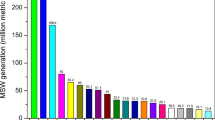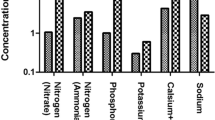Abstract
This paper examines four strategies of municipal solid waste management (MSWM) for Algiers city using life cycle assessment methodology. Analyzed options include the current WM landfilling system (SC1), landfilling with biogas recovery (SC2), anaerobic digestion (SC3), and anaerobic digestion with energy recovery (SC4). Real facilities in the city provided data for the inventory and background process data were taken from Ecoinvent V3.1 of SimaPro 8.1. Scenarios were compared using ReCiPe evaluation method. Results indicate that baseline scenario produces the greatest impact due diesel emissions for transportation and biogas emitted. Meanwhile, steel used for industrial installations and engines emissions contribute negatively in anaerobic digestion scenarios. Furthermore, AD scenarios shows significant improvement in all impact categories except eutrophication, toxicity and human health, which is due to high NOx and CO emissions from the biogas engine. The SC4 scenario achieved the least environmental impact where it eliminates 403.06 kg CO2 eq/t waste, saves fossil fuels with a net avoidance of 18.2 PJ/t waste, and electricity generation of 280 GWhel/year, covering 6% of the city electricity needs. The sensitivity analysis revealed that the variation of parameters do not alter the ranking order of scenarios affirming the reliability of results.
Graphical abstract








Similar content being viewed by others
References
Kaza S, Yao L, Bhada-Tata P, Van Woerden F (2018) What a waste 2.0: A global snapshot of solid waste management to 2050. The World Bank
Karim O, Youcef K, Mehdi L (2016) Characterization of household and similar waste in the northern, semi-arid and arid areas of Algeria. National Waste Agency
Djemaci B (2014) Impact des facteurs d’attractivité des territoires sur la production future des déchets urbains en Algérie: Mondes en développement no. 166:113–130. https://doi.org/10.3917/med.166.0113
Tsydenova N, Vázquez Morillas A, Cruz Salas A (2018) Sustainability assessment of waste management system for Mexico city (Mexico)—Based on analytic hierarchy process. Recycling 3:45. https://doi.org/10.3390/recycling3030045
Abderrezek KG (2016) Les énergies Renouvelables, Un Pilier De Développement De L’agriculture Algérienne: Cas De L’énergie éolienne. Magazine économique 259. https://doi.org/10.33704/1748-002-007-019
Rana R, Ganguly R, Gupta AK (2019) Life-cycle assessment of municipal solid-waste management strategies in Tricity region of India. J Mater Cycles Waste Manag 21:606–623. https://doi.org/10.1007/s10163-018-00822-0
Cherubini F, Bargigli S, Ulgiati S (2009) Life cycle assessment (LCA) of waste management strategies: Landfilling, sorting plant and incineration. Energy 34:2116–2123. https://doi.org/10.1016/j.energy.2008.08.023
Dong J, Chi Y, Zou D et al (2014) Comparison of municipal solid waste treatment technologies from a life cycle perspective in China. Waste Manag Res 32:13–23. https://doi.org/10.1177/0734242X13507311
Cleary J (2009) Life cycle assessments of municipal solid waste management systems: A comparative analysis of selected peer-reviewed literature. Environ Int 35:1256–1266. https://doi.org/10.1016/j.envint.2009.07.009
Laurent A, Bakas I, Clavreul J et al (2014) Review of LCA studies of solid waste management systems—Part I: Lessons learned and perspectives. Waste Manage 34:573–588. https://doi.org/10.1016/j.wasman.2013.10.045
Laurent A, Clavreul J, Bernstad A et al (2014) Review of LCA studies of solid waste management systems—Part II: Methodological guidance for a better practice. Waste Manage 34:589–606. https://doi.org/10.1016/j.wasman.2013.12.004
Zhou Z, Tang Y, Chi Y et al (2018) Waste-to-energy: A review of life cycle assessment and its extension methods. Waste Manag Res 36:3–16. https://doi.org/10.1177/0734242X17730137
Mayer F, Bhandari R, Gäth S (2019) Critical review on life cycle assessment of conventional and innovative waste-to-energy technologies. Sci Total Environ 672:708–721. https://doi.org/10.1016/j.scitotenv.2019.03.449
Zhang J, Qin Q, Li G, Tseng C-H (2021) Sustainable municipal waste management strategies through life cycle assessment method: A review. J Environ Manage 287:112238. https://doi.org/10.1016/j.jenvman.2021.112238
Tunesi S, Baroni S, Boarini S (2016) Waste flow analysis and life cycle assessment of integrated waste management systems as planning tools: Application to optimise the system of the City of Bologna. Waste Manag Res 34:933–946. https://doi.org/10.1177/0734242X16644520
Mancini E, Arzoumanidis I, Raggi A (2019) Evaluation of potential environmental impacts related to two organic waste treatment options in Italy. J Clean Prod 214:927–938. https://doi.org/10.1016/j.jclepro.2018.12.321
Fernández-Nava Y, del Río J, Rodríguez-Iglesias J et al (2014) Life cycle assessment of different municipal solid waste management options: a case study of Asturias (Spain). J Clean Prod 81:178–189. https://doi.org/10.1016/j.jclepro.2014.06.008
Evangelisti S, Lettieri P, Borello D, Clift R (2014) Life cycle assessment of energy from waste via anaerobic digestion: A UK case study. Waste Manage 34:226–237. https://doi.org/10.1016/j.wasman.2013.09.013
Wang D, He J, Tang Y-T et al (2020) Life cycle assessment of municipal solid waste management in Nottingham, England: Past and future perspectives. J Clean Prod 251:119636. https://doi.org/10.1016/j.jclepro.2019.119636
Kaazke J, Meneses M, Wilke B-M, Rotter VS (2013) Environmental evaluation of waste treatment scenarios for the towns Khanty-Mansiysk and Surgut, Russia. Waste Manag Res 31:315–326. https://doi.org/10.1177/0734242X12473792
Zaikova A, Vinitskaia N, Deviatkin I et al (2022) Life cycle assessment of existing and alternative options for municipal solid waste management in Saint Petersburg and the Leningrad Region. Russia Recycling 7:19. https://doi.org/10.3390/recycling7020019
Khandelwal H, Thalla AK, Kumar S, Kumar R (2019) Life cycle assessment of municipal solid waste management options for India. Biores Technol 288:121515. https://doi.org/10.1016/j.biortech.2019.121515
Akhavan Limoodehi F, Tayefeh SM, Heydari R, Abdoli MA (2017) Life Cycle Assessment of Municipal Solid Waste Management in Tehran. Environ Energy Econ Res 1(2):207–218. https://doi.org/10.22097/eeer.2017.47247
Falahi M, Avami A (2020) Optimization of the municipal solid waste management system using a hybrid life cycle assessment–emergy approach in Tehran. J Mater Cycles Waste Manag 22:133–149. https://doi.org/10.1007/s10163-019-00919-0
Chi Y, Dong J, Tang Y et al (2015) Life cycle assessment of municipal solid waste source-separated collection and integrated waste management systems in Hangzhou, China. J Mater Cycles Waste Manag 17:695–706. https://doi.org/10.1007/s10163-014-0300-8
Dastjerdi B, Strezov V, Kumar R et al (2021) Comparative life cycle assessment of system solution scenarios for residual municipal solid waste management in NSW, Australia. Sci Total Environment 767:144355. https://doi.org/10.1016/j.scitotenv.2020.144355
Fudala-Ksiazek S, Pierpaoli M, Kulbat E, Luczkiewicz A (2016) A modern solid waste management strategy: The generation of new by-products. Waste Manage 49:516–529. https://doi.org/10.1016/j.wasman.2016.01.022
Ramachandra TV, Bharath HA, Kulkarni G, Han SS (2018) Municipal solid waste: Generation, composition and GHG emissions in Bangalore, India. Renew Sustain Energy Rev 82:1122–1136. https://doi.org/10.1016/j.rser.2017.09.085
Demetrious A, Crossin E (2019) Life cycle assessment of paper and plastic packaging waste in landfill, incineration, and gasification-pyrolysis. J Mater Cycles Waste Manag 21:850–860. https://doi.org/10.1007/s10163-019-00842-4
Pace SA, Yazdani R, Kendall A et al (2018) Impact of organic waste composition on life cycle energy production, global warming and Water use for treatment by anaerobic digestion followed by composting. Resour Conserv Recycl 137:126–135. https://doi.org/10.1016/j.resconrec.2018.05.030
Slorach PC, Jeswani HK, Cuéllar-Franca R, Azapagic A (2019) Environmental and economic implications of recovering resources from food waste in a circular economy. Sci Total Environ 693:133516. https://doi.org/10.1016/j.scitotenv.2019.07.322
Guven H, Wang Z, Eriksson O (2019) Evaluation of future food waste management alternatives in Istanbul from the life cycle assessment perspective. J Clean Prod 239:117999. https://doi.org/10.1016/j.jclepro.2019.117999
dos Santo IFS, Mensah JHR, Gonçalves ATT, Barros RM (2020) Incineration of municipal solid waste in Brazil: An analysis of the economically viable energy potential. Renewable Energy 149:1386–1394
Kong D, Shan J, Iacoboni M, Maguin SR (2012) Evaluating greenhouse gas impacts of organic waste management options using life cycle assessment. Waste Manag Res 30:800–812. https://doi.org/10.1177/0734242X12440479
Ogundipe FO, Jimoh OD (2015) Life cycle assessment of municipal solid waste management in Minna, Niger State, Nigeria. Int J Environ Res 9:1305–1314
Balogun-Adeleye RM, Longe EO, Aiyesimoju KO (2019) Environmental assessment of municipal solid waste (MSW) disposal options: A case study of Olushosun landfill, Lagos State. IOP Conf Ser: Mater Sci Eng 640:012091. https://doi.org/10.1088/1757-899X/640/1/012091
Senhaji F (2008) Récupération et torchage du CH4 méthane de la décharge de l’oulja à Rabat-Salé (Maroc). In: International training Center cdm. Alger, Algeria
Kamaruddin MA, MohdS Y, Aziz HA, Hung Y-T (2015) Sustainable treatment of landfill leachate. Appl Water Sci 5:113–126. https://doi.org/10.1007/s13201-014-0177-7
Doka G (2009) Life cycle inventories of waste treatment services Ecoinvent report No. 13. Swiss Centre for Life Cycle inventories, Dübendorf. p111
Reddy KR, Kumar G, Giri RK (2017) Modeling coupled processes in municipal solid waste landfills: An overview with key engineering challenges. Int J of Geosynth and Ground Eng 3:6. https://doi.org/10.1007/s40891-016-0082-2
Dajić A, Mihajlović M, Jovanović M et al (2016) Landfill design: need for improvement of water and soil protection requirements in EU landfill directive. Clean Techn Environ Policy 18:753–764. https://doi.org/10.1007/s10098-015-1046-2
Whiting A, Azapagic A (2014) Life cycle environmental impacts of generating electricity and heat from biogas produced by anaerobic digestion. Energy 70:181–193. https://doi.org/10.1016/j.energy.2014.03.103
Nimaa TD, Guyb M (2016) Sorting-Composting of Biodegradable Waste in the Municipality of Chief (Algeria): The Key Steps. Int J Waste Resour 6. DOI: https://doi.org/10.4172/2252-5211.1000204
Kaparaju P, Rintala J (2013) Generation of heat and power from biogas for stationary applications: boilers, gas engines and turbines, combined heat and power (CHP) plants and fuel cells. In: The Biogas Handbook. Elsevier, pp 404–427
Fruergaard T, Astrup T (2011) Optimal utilization of waste-to-energy in an LCA perspective. Waste Manage 31:572–582. https://doi.org/10.1016/j.wasman.2010.09.009
Milutinović B, Stefanović G, Đekić PS et al (2017) Environmental assessment of waste management scenarios with energy recovery using life cycle assessment and multi-criteria analysis. Energy 137:917–926. https://doi.org/10.1016/j.energy.2017.02.167
Jain S, Singhal S, Pandey S (2020) Environmental life cycle assessment of construction and demolition waste recycling: A case of urban India. Resour Conserv Recycl 155:104642. https://doi.org/10.1016/j.resconrec.2019.104642
Haupt M, Kägi T, Hellweg S (2018) Modular life cycle assessment of municipal solid waste management. Waste Manage 79:815–827. https://doi.org/10.1016/j.wasman.2018.03.035
Miliūte J, Kazimieras Staniškis J (2010) Application of life-cycle assessment in optimisation of municipal waste management systems: the case of Lithuania. Waste Manag Res 28:298–308. https://doi.org/10.1177/0734242X09342149
Mendes MR, Aramaki T, Hanaki K (2004) Comparison of the environmental impact of incineration and landfilling in São Paulo City as determined by LCA. Resour Conserv Recycl 41:47–63. https://doi.org/10.1016/j.resconrec.2003.08.003
Gunamantha M, Sarto, (2012) Life cycle assessment of municipal solid waste treatment to energy options: Case study of KARTAMANTUL region, Yogyakarta. Renewable Energy 41:277–284. https://doi.org/10.1016/j.renene.2011.11.008
Richard EN, Hilonga A, Machunda RL, Njau KN (2021) Life cycle analysis of potential municipal solid wastes management scenarios in Tanzania: the case of Arusha City. Sustain Environ Res 31:1. https://doi.org/10.1186/s42834-020-00075-3
Tong H, Shen Y, Zhang J et al (2018) A comparative life cycle assessment on four waste-to-energy scenarios for food waste generated in eateries. Appl Energy 225:1143–1157. https://doi.org/10.1016/j.apenergy.2018.05.062
Belboom S, Digneffe J-M, Renzoni R et al (2013) Comparing technologies for municipal solid waste management using life cycle assessment methodology: A Belgian case study. Int J Life Cycle Assess 18:1513–1523. https://doi.org/10.1007/s11367-013-0603-3
Ioannou-Ttofa L (2021) Life cycle assessment of household biogas production in Egypt: Influence of digester volume, biogas leakages, and digestate valorization as biofertilizer. Journal of Cleaner Production 14
Author information
Authors and Affiliations
Corresponding author
Ethics declarations
Conflict of interest
The authors declare that there is no conflict of interest.
Additional information
Publisher's Note
Springer Nature remains neutral with regard to jurisdictional claims in published maps and institutional affiliations.
Supplementary Information
Below is the link to the electronic supplementary material.
Rights and permissions
Springer Nature or its licensor (e.g. a society or other partner) holds exclusive rights to this article under a publishing agreement with the author(s) or other rightsholder(s); author self-archiving of the accepted manuscript version of this article is solely governed by the terms of such publishing agreement and applicable law.
About this article
Cite this article
Zibouche, S., Amouri, M. & Bouarab, R. Life cycle assessment of different municipal solid waste management options: a case study of Algiers (Algeria). J Mater Cycles Waste Manag 25, 954–969 (2023). https://doi.org/10.1007/s10163-022-01576-6
Received:
Accepted:
Published:
Issue Date:
DOI: https://doi.org/10.1007/s10163-022-01576-6




